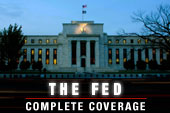Monetary policy took an important step forward last week when the Federal Reserve made it clear that unemployment would receive more weight in its policy decisions, and inflation would be less of a priority. The Fed has not, by any means, abandoned its commitment to price stability. But it is more willing than it has been in the past to remain focused on the unemployment problem even if inflation drifts temporarily above its target value.
There is always room for the Fed to do better. I would like, for example, to see even more tolerance for inflation as we try to reduce the unemployment rate. But the Fed is clearly reassessing its policy procedures in light of the experience of the Great Recession, and making changes to try to improve its current and future policy performance.
RELATED: Fed Sets Historic Targets for Unemployment and Inflation
I wish I could say the same about fiscal policy. In a deep recession, monetary policy alone is not enough to give the economy the best chance at recovery, fiscal policy is also needed. But gridlock in Congress motivated by differing ideologies and obstructionist politics stands in the way an effective response from fiscal policy authorities.

It’s not that the two sides disagree on the ability of fiscal policy to impact the economy. Some Republicans oppose fiscal policy of any type, but for the most part conservatives readily advocate tax cuts to stimulate a lagging economy. In addition, they speak up loudly about job losses or gains when the discussion is about defense spending, and their concern about the economic impact of the fiscal cliff is further evidence that they believe that both spending and taxes matter for economic activity.
If both sides agree that taxes and spending can be used to offset recessions, then why can’t we use fiscal policy more effectively? A big reason is disagreement over whether government spending or tax changes should be the main tool of fiscal policy. However, this is just a reflection of a more fundamental ideological difference about the size and role of government, and the worry that the other party will use recessions as an excuse to impose its ideological beliefs.
When fiscal policy is used to stabilize the economy, the size of government can grow, shrink, or remain the same depending upon the specifics of the spending and tax changes. For example, suppose that government uses deficit spending to stimulate the economy in recessions, and then raises taxes to close the budget gap once the economy recovers. As this is repeated over time – in each recession government spending is increased and taxes are increased to pay for it – the size of government and the burden of taxes will grow. Conservatives, who believe Democrats use Keynesian stabilization policy in this way to increase the size of government, are opposed to such measures.
Or, consider the opposite. When a recession hits, the government uses tax cuts to stimulate the economy, and the resulting budget gap is closed by cutting spending the after economy has recovered. If this policy is repeated every time a recession hits, government will shrink after each economic downturn and key social services will be harder and harder to support. Democrats who value such services would, of course, object to these “starve the beast” type policies.
However, fiscal policy does not have to change the size of government. The examples above involve a combination of tax and spending changes, but if only one or the other is used – if spending increases or tax cuts are used in isolation and fully reversed after the economy recovers – the size of government will remain unchanged.
This suggests a proposal for fiscal policy. When there is an official, NBER declared recession, each political party should be allowed to implement government spending or tax changes that it desires (within predetermined bounds, and with additional rounds if necessary). But the policies must be budget neutral overall and they must not change the level of spending or taxes in the long-run. If either side wants to try to make the spending or tax cuts permanent later, there is no way to prevent that, but the default position in the legislation must be no long-run changes. That forces any attempt to make tax or spending changes permanent to be debated openly and agreed upon in new legislation. If no agreement can be reached, then we go back to the way things were before the stabilization policy was initiated.
Fiscal policy is a critical tool in deep recessions, but we have not employed it effectively due to the politics that surround it – the notion, for example, that a political party should “Never let a serious crisis go to waste.” But while there will always be political disagreements standing in the way of fully effective fiscal policy, anything we can do to separate the technocratic job of stabilizing the economy from the political fight over the size of government will improve our ability to respond to severe economic downturns.






